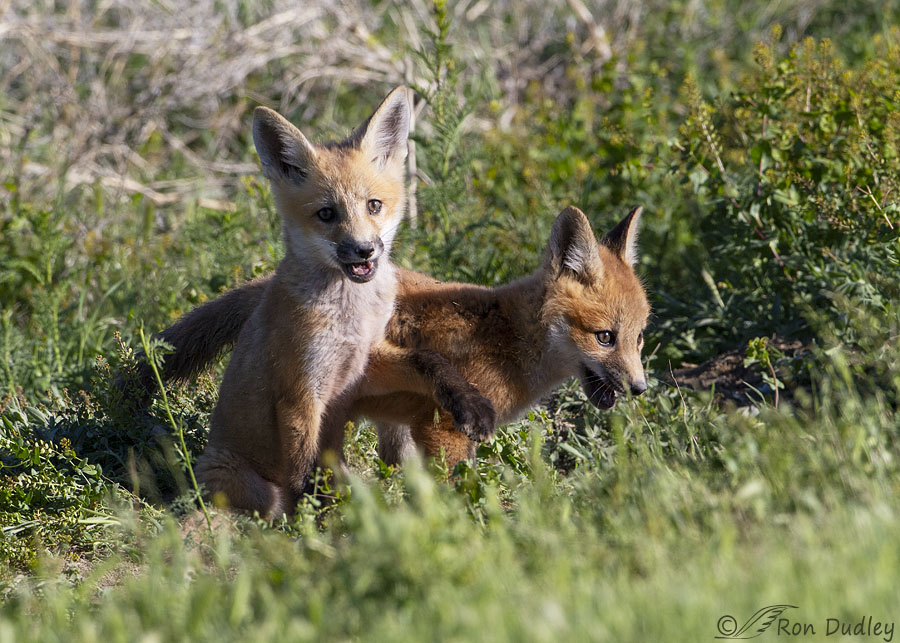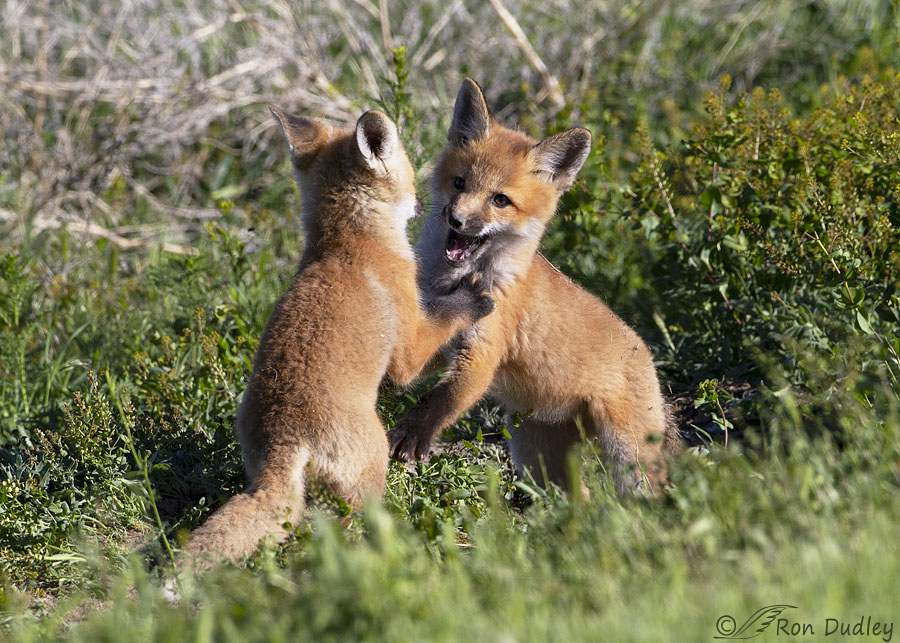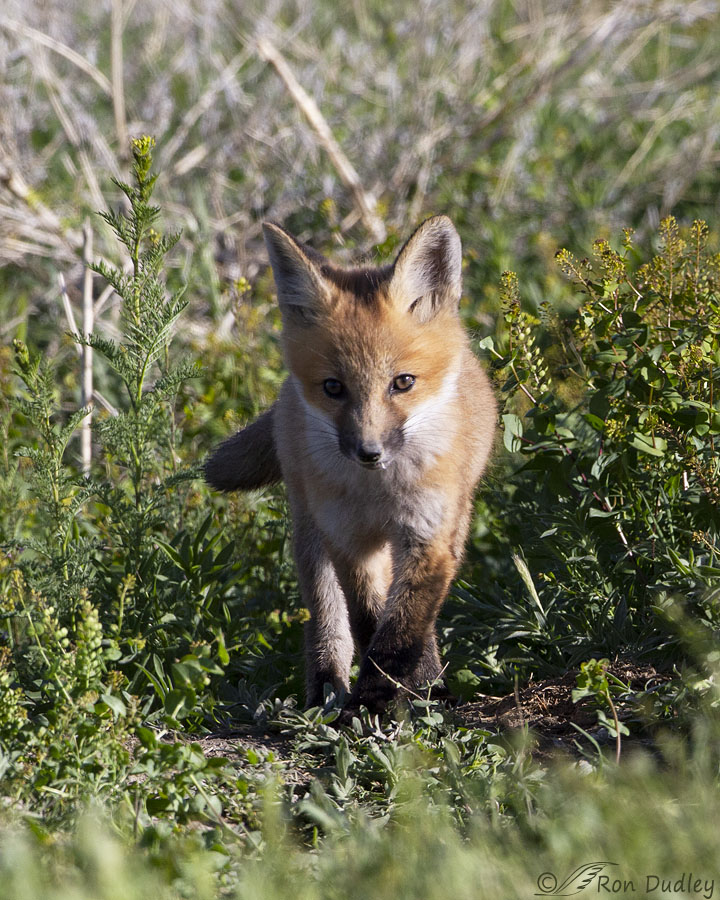If I can’t get white this time of year I’ll take green, especially when playful fox kits are part of the picture. I’m rapidly growing weary of browns and grays.

1/1000, f/10, ISO 500, Canon 7D, Canon EF 500mm f/4L IS USM, not baited, set up or called in
In the late spring of 2010 I spent part of a delightful morning with sibling Red Fox kits at Bear River MBR. Their den was right along the edge of the auto tour road so the young pups were hard to miss when they were out and about.
There were four of them but one was more shy than the others and spent less time out of the den. They were usually side lit but I still managed to get many photos of their antics that please me.

1/1250, f/10, ISO 500, Canon 7D, Canon EF 500mm f/4L IS USM, not baited, set up or called in
Typical of young canids they spent much of their time in play – pouncing on each other, wrestling and biting nearly everything and everyone in sight. Other than the sibling that spent most of its time in the den they paid me no nevermind as they frolicked in the spring greenery around the den entrance.
I stayed in my pickup and they were obviously acclimated to vehicles on the refuge road right next to their den so they just went about their business of having fun.

1/1000, f/10, ISO 500, Canon 7D, Canon EF 500mm f/4L IS USM, not baited, set up or called in
This little guy kept trying to entice me into joining in the fun. ‘He’ repeatedly stalked me (or my pickup) and then play-charged at the end of the stalk – just like the siblings were constantly doing to each other. Here my shutter clicked just as he began a playful lunge in my direction.
Encounters like this are a big part of the reason I’m a bird and nature photographer. Even if I come away without any decent photos they lift my spirits and make me feel good about the world again, if only briefly.
Ron
Notes:
- Baby or young foxes are properly called cubs, pups or kits. Here I’ve used two of those terms interchangeably.
- I never saw an adult fox on that morning. I suspect they were out hunting.
- I hate to end this upbeat post on a downer but it’s neither my style nor my habit to avoid reality just because it’s unpleasant. Despite repeated attempts in the following days I never saw these youngsters again. I believe they fell victim to the non-native predator control policies of the National Wildlife Refuge system.


Wonderful Series Ron!
Such a happy, carefree post…until you pulled the rug out from under me. We MAKE the problems (by encroaching on/ruining the animals’ habitat) and then when the animals find a way to accommodate to these natural selection stressors, we take it upon ourselves to interfere again — for their own good (which is total bullshit!).
Yet again why I prefer the company of animals to most people.
Sorry, Marty. Shit happens, especially when humans are involved.
Ron,
I saw an adult red fox a couple of years ago in the fall. It was on the east of the roadway as you describe being hit with golden evening light. I have read in your blog that foxes on the refuge have been trapped and removed. That is a shame–laws of nature and all. But at least I have hope that some may persist in that locale. (BTW, that photo won first place in my camera club contest and hangs in the OR lounge at my work. So, I guess at least one of my shots didn’t stink!)
I also have a den or two of foxes (up to 10-12 total) behind my house around some horse property. They are routinely fed by the locals which I know would send you through the roof, nevertheless they are a predictable treat especially when my granddaughter came for Christmas. And, No, I haven’t fed them but I have enjoyed photographing them… they are QUITE well fed and healthy.
Love the animals and birds and wildlife and seeing nature, etc., etc.
Best and Happy Holidays,
Stephen
Thank you, Stephen. And congrats on getting that winning fox shot.
After contemplating a rant about humans being the ultimate invasive species I calmed down and decided to just enjoy the foxes playing in the greenery and the sun. We had joy, we had fun…
But I wish they’d had more ‘seasons in the sun’…
Lovely photos, I have heard and seen lovely photos of the fox family while they were on the preserve, but I never did see them before their removal.I believe a Tribune reporter even did a positive story on the fox family along the road . Foxes are one of my favorite mammal. I wish I could find some to observe and photograph. I seem to capture only a few butt shots as the foxes run away. I even try where others seem to find foxes in abundance! It is sad that red foxes are not native and relentlessly killed. We can not rehab red foxes in Utah either, only gray foxes. Farmers don’t like foxes or coyotes because they eat their animals. City/urban dwellers don’t like foxes because they will kill small pet dogs and cats. Even zoos exterminate them because foxes are very skilled at entering exhibits and killing zoo animals. I am sure during nesting times in the wetland foxes, and non native raccoons are very destructive to the native bird populations. I still adore them, like EC I have always found them endearing.
“We can not rehab red foxes in Utah either, only gray foxes.”
April, I assume you could also rehab Kit Foxes, even though that would probably be unusual.
Yes we can rehab kit foxes, I wonder if anyone has had one in rehab?
I enjoyed seeing them through your pen and lens. Sad about that last bit.
Thanks, Arwen. Sad indeed.
Adorable. You put a smile on my face!
Good.
I’ll take the joy of beautiful creatures every time, especially young’uns like these! I have to admit (since I know your “style”), I feared at the end you’d tell us they were later killed on the road since their den was so close-by. Not sure which is worse, an accidental or purposeful end. A sad fate, either way.
Chris, that “road” is dirt and thankfully nearly everyone who drives it is looking for birds so they drive very slowly.
Fun! Foxes and all young are cute with all the play that is really honing their skills for “later”. Even if I understand the need for non-native predator control in some areas – like plants – it’s also sad……..
Thanks, Judy.
You will be shocked and surprised (not) to learn that I have a very big soft spot for foxes.
How I would love to have been there that morning. And how I mourn your postscript.
EC, last year I talked to the current manager of the refuge about their predator control policies. She confirmed that they use them on non-native predators.
I understand it – and it doesn’t stop me mourning. We are a spectacular example of non-native predators. All over the world.
Glorious photos of the joys of childhood! Just like parenthood, the activities of childhood are largely ubiquitous and look pretty much the same across species.
The words parent(hood) and child(hood) are used deliberately. In one of my ponderings a couple (or several) decades ago while watching a family pod of gray whales off the Oregon coast, it occurred to me that our language is one of the big factors that separates “us” from the “others” who share this spinning rock out in the middle of nowhere. I’m sure your scientist self won’t go with me here, but think about it for a minute. Simply by using (creating) the words pup, kit, calf, etc. we create a barrier of “other” that opens the door for us to exploit that species because they’re not “us.” Stir in our self-developed religious component with our human hubris and there you go! That was the second I started using the words mom, dad, kiddo, etc. instead. My objective is to close that gap of understanding in our human mind(s) so that we begin to see the wild world as part of US. Yes, I realize there is also value in differentiating who’s who. I’m really NOT as crazy as I sound (look), but there’s also value in closing that gap
And just so you know, I HATE humans and our collective edict to eradicate wildlife!! And when they’re using MY tax money to fund that activity, that REALLY frosts me! I’ll bet you knew that!
An interesting perspective, Laura. Agree with it or not it makes one think and that’s always a good thing.
Recently the Madison Audubon Society introduced some native words to apply to animals. Instead of using “it” to refer to an animal, as most humans do, one of the local tribes used “ki” for an individual and “kin” for multiple individuals. There may be similar words from other indigenous people that reduce objectification and the distance between humans and animals inherent in English pronouns.
The specificity of kit, cub, duck, drake doesn’t seem like it objectifies the other species as much as “it”. The words for the adults does not give much information concerning their family functions, such as father, mother, helper, sister, etc.
Unless a person feels connection with other people who are different from them, I believe it would be even more difficult for that person to feel much connection to an animal.
Pam, I found your last sentence so interesting I read and pondered it three times.
Pam your last sentence nails it for me. I strongly suspect you are right. And would add the word valued to your last sentence. Connected and valued.
Pam Skaar, it should come as no surprise that I agree with you 100%! And especially your last sentence. It has become blatantly obvious that we humans are SO disconnected from the REAL world that anything we can use to reconnect is useful. Language is one huge beginning!!
Count me in as well. And I also agree with EC’s use of the term, “Value.”
Thank you all for commenting. I only recently came to my understanding about connecting to and valuing other people as a prerequisite for connecting to and valuing other living beings.
Great way to start the day. Those little guys are just too cute. We have foxes here, but in 14 plus years I have only seen one and I am out a minimum of 3 days per week. Excellent shots Ron. I am envious.
Thank you, Everett.
First time I’ve laughed this early in the morning in a long time– just to
look at all that grinning “vinegar” ! Besides your puppy reference, they
certainly remind me of cat “kits”, as well…..just beautiful–so full of life !
Question–foxes AREN’T native to northern Utah, then ?
Kris, I almost used “piss and vinegar” as a descriptor in my text of the behavior of these little guys. Red Foxes were historically absent in much of the western US.
Great photos – they made my morning! As a proud owner of a new puppy this summer I can appreciate the playfulness of these cute kits! These pictures make me smile as well as being good photos in their own right. Thanks once again!
Yup, anyone who’s ever owned a puppy gets it, don’t they Joanne.
Love these photos! Such playful, beautiful pups with such expressive faces.
Thank you, Mark.